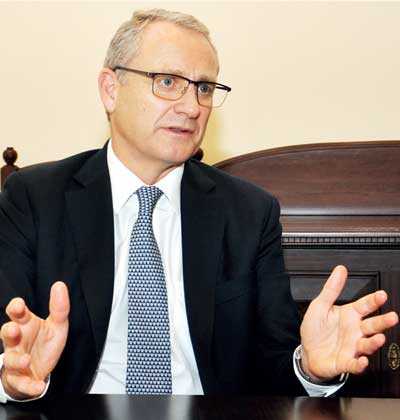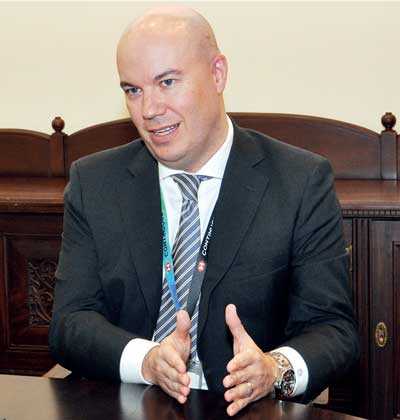Friday Feb 27, 2026
Friday Feb 27, 2026
Wednesday, 12 December 2018 00:00 - - {{hitsCtrl.values.hits}}
By Madushka Balasuriya
Sri Lanka may be in the midst of arguably the most precarious political malaise in its history, but if a new HSBC report is to go by, the outlook for the Asian region as a whole is rather more positive.
 |
HSBC Group General Manager/Asia Pacific Regional Head of Commercial Banking Stuart Tait |
 |
HSBC Sri Lanka and Maldives Head of Wholesale Banking Stuart Rogers |
Among the key takeaways from the Hong Kong-based bank’s annual Navigator survey, which consults 8,000 companies from 34 markets, is that 80% of companies based in Asia are fairly bullish in terms of succeeding in the prevailing trade environment in the region – despite a rise in protectionist thinking globally and in the region.
“These corporates recognised there was a rise in protectionism around the world – whether it’s Sri Lanka, Asia, or the US and beyond, there is a rise – but despite that they’re confident about the trading environment, and they’re confident about their own chances of being successful,” revealed Stuart Tait, HSBC Group General Manager and Regional Head of Commercial Banking (Asia Pacific), in a recent interview with Daily FT.
“I think that’s because they recognise that protectionism itself isn’t new, it’s something that we’ve seen for many decades, and trade and business have a way of finding equilibrium. So there will be these events, but business and trading patterns quite quickly find a way to deal with it. And companies are still successful despite that.”
This optimism bodes well for Sri Lanka, which at the moment is caught in the middle of a power struggle between two factions that fall on either side of the line demarcating protectionist and more open market governing philosophies.
That said, according to HSBC Head of Wholesale Banking (Sri Lanka and Maldives) Stuart Rogers, regardless of which way the pendulum swings, of paramount importance for countries like Sri Lanka – i.e. one’s looking to capitalise on the growing confidence in Asia-centric trade - is policy consistency.
“I think irrespective of who’s in power from a political perspective, having consistency of policy is important, creating an environment where businesses want come and invest. If you look at Sri Lanka’s FDI relative to other markets in Asia it’s relatively small,” he noted.
“When you look at who they’re competitors in the market are, a number of these countries are improving that ease of doing business at a faster rate than Sri Lanka.”
Further to this, Rogers also emphasised the importance of offering incentives to international investors in relation to competing nations such as Vietnam, Bangladesh or Thailand, so as to attract more foreign direct investments (FDIs).
With another key aspect of the survey companies’ seemingly organic shift in focus from going into new markets to gaining share in existing markets, it is now more critical than ever that Sri Lanka recognises and consolidates its strengths, noted Rogers.
“Probably a wide suite of those incentives I think would help attract more FDIs than what you’ve seen over the past couple of years,” he said.
“When you look at the size of the population here, we’re in the low 20 millions, we’re not going to be competitive against a Bangladesh or a Vietnam where the populations are a multiple folds of what Sri Lanka has.
“So I think Sri Lanka has got to use innovation and value add into the process to plug into that, finding the right product to be competitive on a regional and global stage. Doing basic, kind of, contract manufacturing work is just not cost competitive in this market.”
The role of China
When speaking about trade within Asia, it’s impossible to avoid the role of China; while, traditionally, China has been seen as a major source of manufacturing and supplier of cheap products into the market, the Asian giant’s function is now gradually changing.
Taking a look at the Chinese market, the Navigator report found that China’s recent increase in middle class households, rise in prosperity, and rise in general consumerism, has led to a situation where companies are now looking at way in which they can make products ‘for’ China, as opposed to where they previously simply bought ‘from’ them.
“Companies around the world are now figuring out how their products and services should be shaped for the China market,” explained Tait.
“What the survey shows is the real importance of the quality of the product and the service, so when Chinese consumers are looking to buy from international companies, they’re looking for quality but they’re also looking for a good price. And then for companies outside wanting to do business there it’s about how they distribute the product.”
According to Tait, companies looking to China as a potential market, they will also need to navigate one final obstacle, in that it is critical that their business or product is readily available on e-commerce platforms.
“The generation that’s driving consumption in China are the millennials, and they’ve grown up with e-commerce platforms. So companies outside of China, in Sri Lanka, selling there need to think about the product, how it’s distributed, and the use of e-commerce.”
Add into this equation China’s Belt and Road initiative and suddenly a picture begins to form, a pathway to prosperity for companies willing and able to strike early.
“The Belt and Road initiative is largely about infrastructure at the moment, but we believe e-commerce and trade will follow where the investments are made.”
Moreover, with recent research predicting that by 2030 44% of the population in Asia will live in cities, and Asia set to be home to some 1.2 billion middle class households – two thirds of the world’s middle class population, it is unsurprising to see such heavy focus on the Asian region as a whole.
As such, it also of little surprise that among the most optimistic markets in the Navigator survey were those in India, Bangladesh and Thailand, followed closely by Australia, China and ASEAN (Association of Southeast Asian Nations).
“ASEAN if it were a country, it would be the world’s seventh largest economy. We think by 2020 it could be the world’s fifth largest economy.”
The US-China trade war
While the US, along with the EU, are among Sri Lanka’s major trade partners, the fact still remains that the intra-Asia trade market is bigger than its relationship with North America and Europe combined. As such, according to Tait, more of HSBC’s customers are looking increasingly at the Asian region as an important area to do business, arguably more now than they have done at any other point in recent history.
When you add a potential US-China trade war into this mix, adds Rogers, it becomes clearer as to why companies might feel new opportunities are just around the corner.
“China and the US are finding different markets to both source and sell to. For markets like Vietnam, Thailand, India and Sri Lanka, a China-US trade war should actually create an opportunity, to not necessarily be a major drag on their business but to potentially have an upside – in terms of attracting investment into your country but also picking up the trade flow,” stated Rogers. “That’s just one example of maybe something that’s a negative but that’s actually a positive opportunity.”
“That’s a really important point, because as tariffs come in, clearly Chinese companies are looking at manufacturing elsewhere – as Stuart says they’re looking at Thailand, Malaysia, even Singapore - and it’s probably no coincidence that the most optimistic, the most confident companies in this Navigator survey were ASEAN companies, because they would expect to be beneficiaries of shifting supply chains,” added Tait.
“And we do see that. I travel around countries and we see customers in each of those markets and other markets, and they clearly see an opportunity to pick up investment and manufacturing capacity.”
Indeed, according to the Navigator survey the number of North American companies who targeting Asia as a future growth market has fallen by 18% from a previous survey, while the number of Asian companies targeting North America as their future growth market has fallen by 8%. This, said Tait, is good news for HSBC.
“What you’re seeing is there’s more focus on Asia relative to North America than there was historically. And that is good for a company like ours because most of our business is in Asia, and it’s perhaps good for Asian companies that they realise they’ve got this terrific opportunity right on their own doorstep.”
The Sri Lankan opportunity
For Sri Lanka, despite the current murky political waters the country is treading, there is more than a semblance of hope. While many a casual observer will take the plummeting exchange rates, and political instability as red flags, both Tait and Rogers believe the country is still well placed to make full use of the opportunity at hand.
“I think in the local market, contextually because it runs structural twin deficits, the currency generally will depreciate because those are the underlying economic fundamentals in Sri Lanka. But there are two sides to the equation here, and emerging market currencies generally have all depreciated around similar percentages,” explained Rogers.
“Obviously the political situation creates instability and investors don’t like instability, so therefore you see foreign investors taking some of their money out, but money can come again. When stability returns, there are still great fundamentals in this country that can bring investment dollars in.
“I think when you look at the geographic location, you look at volumes going through the port, the transhipment volumes and the overall volumes going through the port in terms of percentage growth, are some of the best anywhere in the world. There are still plenty of opportunities.”
And while, admittedly, the survey was done before the present political crisis unfolded, Tait believes companies functioning in Asia are well versed in how to deal with such unexpected changes.
In fact it is moments like this where a bank like HSBC is particularly well placed in helping businesses navigate the markets and protect themselves from risk.
“The survey was done when in September, but they [the companies] believe. They’ve got experience of working in markets with currency movement, interest rate movement, natural disasters, economic meltdowns, political changes, but well managed businesses have an ability to be able to deal with this,” assure Tait.
“Customers are alert to the rise in protectionism, they’re certainly aware of the volatility, they’re aware of some changes happening in individual country levels across some of the regions, but it doesn’t seem to be enough to outweigh the prospects – particularly in Asia – that they see about economic growth.
“What we do is work with our customers to help explain what we see happening in the markets, and the steps that they can take to hedge their positions and protect themselves from outside risks.”
Added, Rogers: “That’s consistent with Sri Lanka, where businesses are getting on with doing business, and businesses here – the longest any business has survived is a 30 year civil war - so even with short term hurdles they will continue to plan, and our role in the ecosystem is to support them in making those plans and executing them.
“Yes we are in a turbulent time, but there have been many turbulent periods both locally and globally before, and as Stuart said good businesses find a way and it’s an opportunity for them as well in volatile situations.”
Pix by Ruwan Walpola